Liberian Journey - African Literacy Campaign
Tuesday, August 6: Today, we bid Jay a fond catch-you-later as he begins a two day Save the Children workshop on problem analysis/solving with fellow “CDs” (country directors) on the hotel grounds. He will turn out to hardly venture beyond Family Kingdom’s front gate for our entire stay.
We, on the other hand, set out freely upon Freetown with only a vague agenda: to maybe see the Minister of Education and maybe some NGO-type people. “We” are the two Sierra Leoneans – Avril and Rogers – Calvin, driver Kabbah in his SUV, and me, American lawyer, riding shotgun. I get to sit up front because I’m paying personally (that is, if we don’t make our GFMe funding goals) and ‘cause just like back 2005 when Sammy Jacobs Abbey and Jay first spotted me, I’m still the “ooold maaaan” (old man, with West African accent).
Sierra Leone is roughly “Lion Mountains,” named for the steep hills and peaks that ring Freetown like the open maw of that noble king of the beasts. (Note: elephants can a lion’s ass any day.)
The city spills down from every incline, with grand concrete houses and tin shacks alike perched, with impossibly vertical streets and driveways, and streams enflamed with red clay-flavored run-offs.
When a bunch of 16th Century American upstarts decided to tell the British where to go, the British sought a revolt of their own, promising slaves their freedom if they escaped over to fight on the Redcoat side. Trouble was, the Brit’s lost and some 4,000 now “freed” Af-Americans found themselves refugees, scratching out an existence in rocky Nova Scotia, attacked by the local white NIMBYs (Not in My Back Yard). Long story short, many of the exiles found their way with London abolitionist funding to the shores of what became Freetown. North Americans had no monopoly on NIMBY-ness. The African kings of this region first pushed back hard on the arrivals, as did malaria and other un-fun continental maladies. Perseverance prevailed clearly: now regard an 8,000,000-plus populated republic and its tightly packed capital city now trying to make its way 200 years later.
Blocks from the hotel, we obtain Le 900,000 for $100 U.S., with
Tim Bowles
9 chapters
16 Apr 2020
Chapter Five - From Nothing to Crushing
August 06, 2019
|
Freetown, Sierra Leone
Tuesday, August 6: Today, we bid Jay a fond catch-you-later as he begins a two day Save the Children workshop on problem analysis/solving with fellow “CDs” (country directors) on the hotel grounds. He will turn out to hardly venture beyond Family Kingdom’s front gate for our entire stay.
We, on the other hand, set out freely upon Freetown with only a vague agenda: to maybe see the Minister of Education and maybe some NGO-type people. “We” are the two Sierra Leoneans – Avril and Rogers – Calvin, driver Kabbah in his SUV, and me, American lawyer, riding shotgun. I get to sit up front because I’m paying personally (that is, if we don’t make our GFMe funding goals) and ‘cause just like back 2005 when Sammy Jacobs Abbey and Jay first spotted me, I’m still the “ooold maaaan” (old man, with West African accent).
Sierra Leone is roughly “Lion Mountains,” named for the steep hills and peaks that ring Freetown like the open maw of that noble king of the beasts. (Note: elephants can a lion’s ass any day.)
The city spills down from every incline, with grand concrete houses and tin shacks alike perched, with impossibly vertical streets and driveways, and streams enflamed with red clay-flavored run-offs.
When a bunch of 16th Century American upstarts decided to tell the British where to go, the British sought a revolt of their own, promising slaves their freedom if they escaped over to fight on the Redcoat side. Trouble was, the Brit’s lost and some 4,000 now “freed” Af-Americans found themselves refugees, scratching out an existence in rocky Nova Scotia, attacked by the local white NIMBYs (Not in My Back Yard). Long story short, many of the exiles found their way with London abolitionist funding to the shores of what became Freetown. North Americans had no monopoly on NIMBY-ness. The African kings of this region first pushed back hard on the arrivals, as did malaria and other un-fun continental maladies. Perseverance prevailed clearly: now regard an 8,000,000-plus populated republic and its tightly packed capital city now trying to make its way 200 years later.
Blocks from the hotel, we obtain Le 900,000 for $100 U.S., with
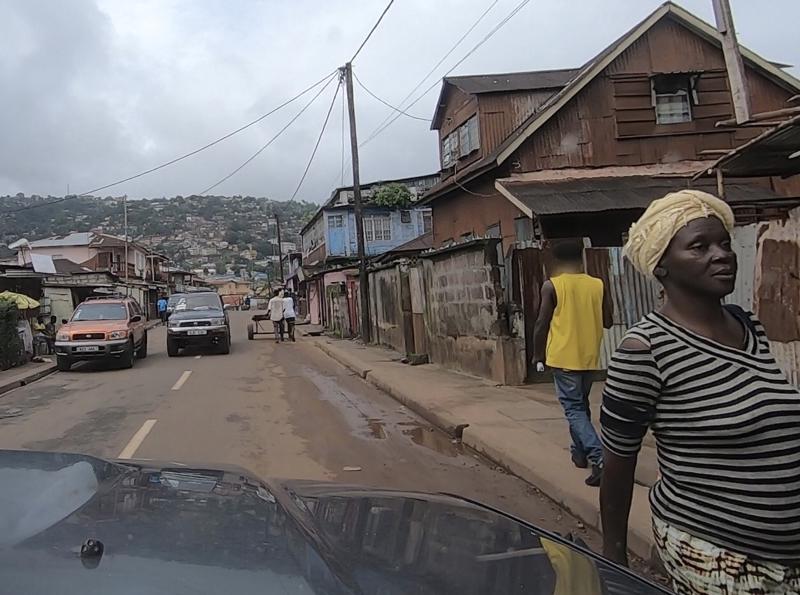
resulting big wad entrusted to Calvin. Then, we’re in town, streets narrowing, ancient wood-constructed houses leaning in, zig-zagging our way to and past the gigantic Cotton Tree, the symbol of the nation (e.g. on the money) in the center of the city. My recall on city layout is not too bad: U.N. Special Court, Pademba Road Prison, the ministries. While the “boys” (Calvin, Avril, eventually Rogers) disappear into the Orange mobile phone headquarters so that Cal might bag a local SIM card and “top up,” Kabbah and I hang in the car just outside, Shiaka Stevens Road, watching Humanity flow by.
This is not your Hollywood version, this is real deal Africa. The sidewalk off my elbow is dominated by money changers, sitting shoulder-by-shoulder on the steps of Orange’s office, I imagine all working for one kingpin who’s keeping his eye on the operation from somewhere unseen. Most passersby are slow walking (more like drifting) stone-faced, implacable, gazing straight on, eye-contact only by chance.
It’s hot and steamy, between deluges. Drivers are seeking space by staccato horn-language, four-wheelers tolerating the “kay-kays” (3-wheelers from India) and the everywhere motorbike taxis, the drivers stylin’ in fur-rimmed hooded heavy jackets, held down by helmets (yes, fashionably badass, but what has to be the temperature under there?). Your breakfast or lunch is also available from the convenience of your vehicle, trays with melons, bananas, peanuts gliding past on the heads of the lady-vendors. (That, people, you will not see in Pasadena, for certain.)
It’s at this point – sitting in the front seat motionless and heat-challenged with this foreign-yet-now-so-familiar humanity pressing in from all sides – that a heavy gravity fatigue crushes down. The body flags, almost surrendering to a stupor. Is this the ancient weight of all people who have ever lived summed up in this tightly packed African city held back by the sea, many of its citizens etching out an unimaginably bare existence? This sensation does not alarm me. No African day passes for me where this does not attempt to impose itself. It always passes, not so much the need for more potassium as perceiving and absorbing the prevailing collective state of being.
We arrive in Freetown this morning as absolute and total nobodies. I have not been here for ten years. We got no Jay, wrapped back at the hotel. No-one in this town, presumably, has ever heard of Applied Scholastics or Study Tech. We have no appointments, no referrals, no reputation preceding us. This is what one would definitely regard as non-existence.
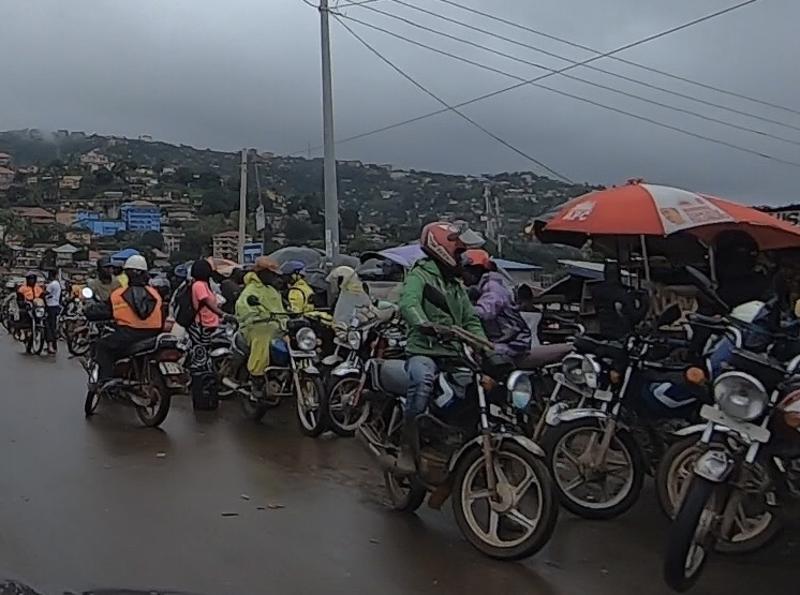
The logical place to start however would be the Ministry of Education, Science and Technology (MEST). So, we motor over to the New England section of town and enter MEST headquarters. We seek out Milton, a bureaucrat Rogers once worked with at MEST who is now Director of Educational Programmes & Services for MEST (I’m likin’ that acronym). His particular MEST office is basement floor, tucked away at the end of the hall. He accepts our invitation to enter. Behold his MEST desk, side tables, book shelves all adorned with loose piles of random files and papers dealing with lots of MEST-related busi-ness.
The director complains of purported busy-ness but permits a ten-minute audience. It’s one of those sleepy meetings. Upon my pitch, the director allows, in so many words, that he’s not really relevant. So, to start our journey today, us neophyte nobodies met a brethren.
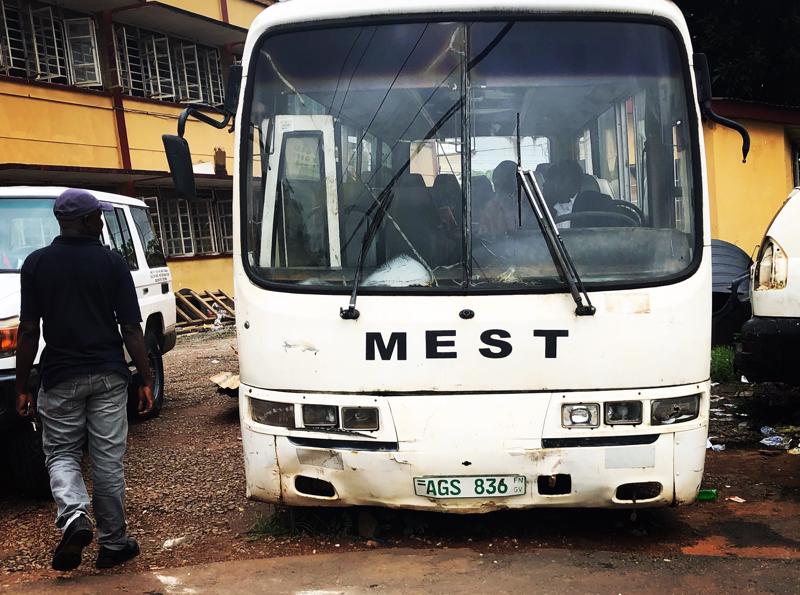
He suggests we go up a few floors to the PermanenT Secretary (or, if you will, the PTS for MEST). Yet, upon the climb, we learn the PTS is out, return unknown (thus reflecting yet more sleepiness). The Deputy Permanent Secretary (or the D-PTS, if you will) for MEST is also out but might be back in 20 minutes (OK, more snore). We sit around in a sitting area, kind of going nowhere in the middle of the MEST with the D-PTS nowhere in sight.
Avril remarks that the First Lady is “into education” and perhaps we drop by her office. This percolates. I find myself perking up. Yep, let’s do that. We’re for two days, no more. So, come to think of it, let’s just skip the sleepy peeps and also pay a courtesy call to the VP and, you know while we’re at it, give the Pres a shot. Heck yeah, let’s do this man!
Leaving word through his assistant that we will try to link up with the D-PTS later, we are up and over into the next valley and pulling into the steep upward driveway of the First Lady’s office compound. There are three or four solders at the foot of the drive, some with AKs, and a bunch more armed guys up by the closed steel door at the top. Kabbah doesn’t notice the string hanging across the drive and almost runs through it. I notice a few of the soldiers not appreciating this (trigger training about to kick in?). We shout Kabbah to a stop (he does). We get out and announce to the head guard, tastefully appointed with his well-oiled weapon, that this American lawyer and his colleagues would like to go in and talk to Her Excellency about literacy and education please. Nope, no can do, need a letter of intro.
You know, that lead guard does have a point. If you show up as a nobody in the driveway of the top levels of leadership, you should at least bring something they can hold onto, perhaps chew on. So, we book it back to my hotel room and bash out intro letters on Applied Scholastics (APS) stationary to First Lady, VP and Pres respectively, one page explaining our mission to train teachers nation- and region-wide on Study Tech (the Mission). We commandeer manila envelopes at my front desk, address and stuff each one with appropriate letter and APS promo and we are in business.
Arriving back at the First-L’s, American Lawyer (that would be me, properly uniformed in standard-issue Brooks Bros. and armed with his signature notepad and printed battleplan clipped on top) is alone permitted access through the 15-foot high red steel gate, through the inner courtyard (populated by various clusters of additional soldiers, doing nothing in particular) and to the first floor secretary. I explain the Mission while handing her the envelope. She’s resistant/no sympathy (normal protocol is through the MEST, who will pass it to somebody, who will pass it to somebody, who will appoint a task force, etc.) but as she continues to hear American Lawyer’s words like “Applied Scholastics,” “American NGO,” and “education,” she brightens and lets drop that she’s got her own education-oriented NGO. Would Applied Scholastics be willing to fund her? “Sounds very interesting but no promises,” I reply.
Now apparently on the prospect of a (probably legitimate) cash infusion to her own project, First-L’s first floor secretary tells me she’ll hand over the letter and materials to the First-L personally that afternoon. I again apologize for the sudden notice and that we have only today and tomorrow to meet with First-L. Still, first floor secretary is not giving up her name or contact number. That’s because there’s no need to call them. They will call us. OK, that’s better than a poke in the eye with a sharp stick.
We motor back the other way to the fairly imposing VP building, on the hill above downtown, overlooking the Cotton Tree, and gain access to the third floor, again with plenty of military in evidence. This time, two personal assistants take the envelope from American Lawyer and politely receive his elevator version of the Mission. They remark that normal channel is through the MEST. I relay that we already tried MEST but that MEST was slow. They take the material assuring us of due consideration in a “don’t hold your breath” kind of way.
OK, so next is the State House, just down the hill, the Sierra Leonean White House. I contemplate the approach that has repeatedly gotten us somewhere in West Africa for over 14 years now: it is always better to ask for forgiveness than permission unless, of course, the “oh, I’m sorry, didn’t know” forgiveness part is liable to get you shot.
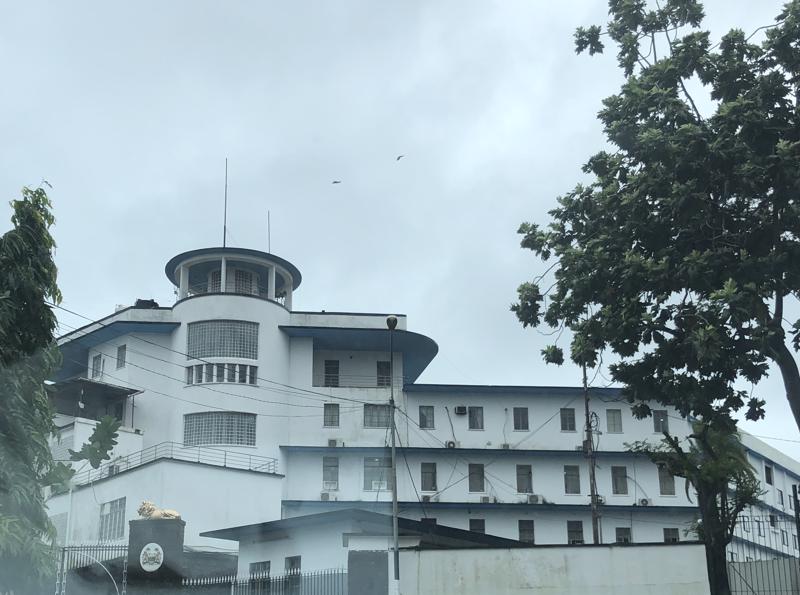
We drive up to the front gate. Guys with bulges under their suit coats come along side, supported by those other big tight-lipped dudes over there with the wrap-around shades.
“We want to see the President.”
“On our list? Appointment time?”
“No, but we have nice letter and other stuff in a big beautiful manila envelope.”
“OK, well then drive down to that little gate (half-block down the hill), park (illegally) and go talk to the lady.”
We park where directed, partly blocking traffic in front of the Sierra Leonean White House, Kabbah freaking a little. We go through the waist-high gate, up three steps and into a small guard house. The lady running the show (Susan, we later learn) already has another four people in line, all pleading access to the President. Rejected, rejected, rejected and … rejected. Our turn. I hand the envelope and mention “education.” Susan starts snapping her fingers at the lady cop at the next desk. “Take this envelope up to the President immediately.” I am thinking “this can’t be happening.” Susan promises to call once we have clearance. “OK, if you say so,” I muse, pretty much incredulous yet not unwilling to let this happen.
We pile into the vehicle and drive the half mile to British Council for a cold call meeting with the country director. 15 minutes max has passed since we dropped the letter. Avril’s phone rings. The State House is calling us to come back, immediately. We about-face, negotiate through two military checkpoints (asks the sentry, also nicely decked out with heavy firepower, to Kabbah: “where you going Commander?” Then to me: “what’s your nationality?” “American.” “Oh, OK, go ahead.”)
So now, we’re back at the State House front gate, no more than 40 minutes after we were first deterred. We explain that we’re now back as directed by the President. Punky to funky man, at practically the speed of light.
We are shown through gate, Kabbah parks (now that I know he’s a tad on the nervous side, I imagine he’s going to be keeping the engine running). The four of us, the three Africans and American Lawyer, are shown through a maze of narrow corridors, solders with AKs at virtually every turn, then through a metal detector, up a red carpeted spiral staircase with the pics of all past presidents and the present chief executive all the way around) and into what must be the cabinet room. Why do I say cabinet room? Because it’s huge with high-backed red velvet chairs, national logos on the doors, flags, and a conference table as long as a runway, that’s why.
We are shown seats along the wall. Opposite, seated at said aircraft carrier-like table, are five or six brass of some kind, sporting crisp uniforms with heavy “scrambled eggs” on the bills of their caps. (Later, we learn these are the top national police and corrections people, about to provide President Bio with his 3:00 p.m. security briefing.)
In walks a young man, 40 tops, in white casual African shirt. Friendly and attentive, he’s Tommy.
Up another flight of those red-carpeted spiral stairs and now we are shedding all electronic devices and other objectionables, with hand-held metal detectors to make sure. Another really narrow corridor, turn left and we are in Tommy’s office. Tommy, it turns out, is the personal assistant – akin to chief of staff I gather – to His Excellency Rtd. Brig. Gen Julius Maada Bio, President of the Republic of Sierra Leone.
While His Excellency’s muffled conversation travels through the wall, American Lawyer briefs Tommy for nearly 30 minutes on the Mission, APS, Study Tech as a proven method for actual learning that can greatly benefit all 87,000 teachers and students nationally. He’s pretty jazzed at the prospect. We discuss some first step details, including hosting key government rep’s at Spanish Lake and indicating we are going back to MEST tomorrow. Tommy wants a concept paper. American Lawyer hears himself say that Tommy shall have it promptly. Tommy supplies personal cell and email contact and we wind our way back down and out. Is this for real?! Evidently.
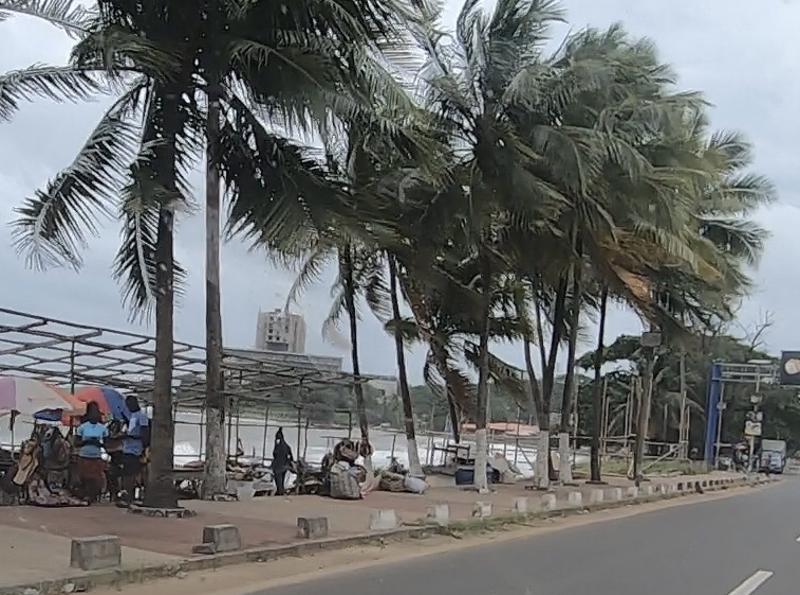
As we exit, I ponder if Power constructed these State House corridors so narrowly for ease of defending in any given gun fight with Rival Wanna-Be Power. Discuss among yourselves.
So, after all the wheel-spinning at last week's outset in Liberia, we are in Salone for less than 18 hours and already hob-knobbing with Power. We so bad.
But, wait for it, day’s not done yet. We stop in at the British Council and then the West African Examination Council (WEAC) offices. A couple of snores, except when I snapped a picture through a glass door of a roomful of stacks of just completed examinations. That brought out an officious official into the lobby officially announcing American Lawyer had exceeded his welcome, as if there was any way I captured content. My bad, delete.
We are back over to the MEST toward 4:00, again seeking conversation with the Deputy Permanent Secretary (as reader recalls, the D-PTS). He’s in. Assistant to the D-PTS motions us, opens D-PTS’s door, we file in. D-PTS looks at the four of us disgustedly and starts yelling over our head at assistant. Feeling frisky after all that heady stuff at the State House, I turn on my heels and sort of dramatically run out of the office.
D-PTS’s door finally opens and he welcomes us in. We have a laugh over my hasty retreat previously. It was an ice-breaker actually. Our work is not his area, but he is sufficiently engaged to walk us down the hall to the outer office of the Chief Education Officer, going in to speak to the man and coming out with a 9:00 a.m. appointment for us tomorrow morning.
We started the morning nowhere, but as night falls, we’ve advanced, literally, from Freetown’s beaches to the seats of this nations Power. We like.
1.
Day One - Just Coming
2.
Chapter Two - Change is Constant
3.
Chapter Three - Traction
4.
Chapter Four - Sweet Salone and the Art of Human Transport
5.
Chapter Five - From Nothing to Crushing
6.
Chapter Six - The Reward for Good Work
7.
Chapter Seven - Invisible, with Liberty, plus Justice
8.
Chapter Eight - Circling Back
9.
Chapter Nine - Closing the Circle
Share your travel adventures like this!
Create your own travel blog in one step
Share with friends and family to follow your journey
Easy set up, no technical knowledge needed and unlimited storage!